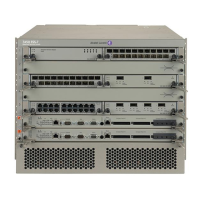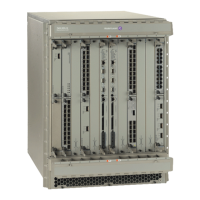Administrative Tasks
282 Basic System Configuration Guide
a: This mode corresponds to scaling and feature set associated with iom-20g.
b: This mode corresponds to scaling and feature set associated with iom-20g-b.
c: This mode corresponds to scaling and feature set associated with iom2-20g.
d: This mode corresponds to scaling and feature set associated with iom3-xp.
If the chassis mode is not explicitly provisioned in the configuration file, the chassis will
come up in chassis mode a by default. The behavior for the IOMs is described in the following
table:
To support a particular chassis-mode, all provisioned IOMs must meet the corresponding
IOM level.
The chassis Mode corresponds to scaling and feature sets associated with a given card. The
base mode is chassis mode A which supports all IOM card types.
IOM cards that are not compatible with more recent 7750 SR chassis modes will be put into
an operationally failed state if the configuration chassis mode force option is used.
• Chassis mode A corresponds to iom-20g, chassis mode backwards compatible for
iom-20g-b, iom2-20g, iom3-xp
• Chassis mode B corresponds to iom-20g-b, chassis mode backwards compatible for
iom2-20g, iom3-xp
• Chassis mode C corresponds to iom2-20g, chassis mode backwards compatible for
iom3-xp
• Chassis mode D corresponds to iom3-xp
Note: Chassis modes are not available on the 7750 SR-c12 router.
Table 38: Provisioned IOM Card Behavior
IOM Behavior
iom-20g-b Comes online if provisioned as iom-20g or iom-20g-b.
iom2-20g Comes online if provisioned as iom-20g, iom-20g-b or iom2-20g.
iom-10g Comes online if provisioned as iom-10g (7450 ESS only).
iom3-xp Comes online if provisioned as iom3-xp.
